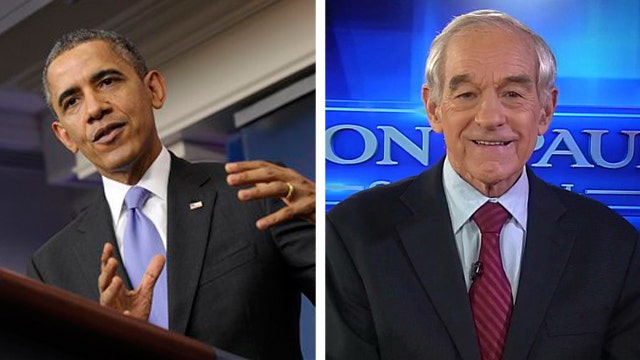This is a rush transcript from "Your World," January 2, 2014. This copy may not be in its final form and may be updated.
STUART VARNEY, GUEST HOST: The health care law officially kicking in, but the numbers still not adding up. That's because more than six million people have lost their -- their health care plans, compared to just over two million that have actually been able to enroll in ObamaCare.
Former Texas congressman, Dr. Ron Paul says this is what you get when the government gets involved.
Dr. Paul, welcome back to the program. Good to see you again, sir.
RON PAUL, R- FORMER U.S. CONGRESSMAN: Thank you, Stuart. Good to be with you.
VARNEY: Does this ObamaCare fiasco spell the end of activist government, do you think?
(LAUGHTER)
PAUL: I wish, but no.
(LAUGHTER)
PAUL: No, there's a lot of die-hards up there. There will be excuses made and the politicians will spin it a certain way, but it will eventually end because it's such a disaster.
I mean, this is a -- this is a sign that the delivery of health care will even be worse than signing up for the health care. So, and it's a -- it's a tax in many ways, because the insurance policies are going up.
VARNEY: Yes.
PAUL: But the big thing that they never ask and never talk about is, the government is supposed to be involved in contracts and -- and -- and having policies.
One is to guarantee the policy, and you can't cancel it. But here the government gets involved and all of a sudden the insurance companies can cancel -- cancel you willy-nilly. The insurance companies thought they were going to get a big deal because they were going to get a lot more customers, but then they had mandates and they had to put certain things on and it's skyrocketing.
I think the cost of medical care, when it's all added up in a year or two, it is going to be huge. It's going to be like a tax. And the quality of care and what people are going to get, everybody tells me, yes, they're canceling me, they're charging me more, I'm getting less, and they're furious. It's going to the biggest political issue in the whole next year or this -- this year in this year's campaign.
VARNEY: But we can't get rid of it in the near term. It cannot be reversed for some time to come.
PAUL: No.
VARNEY: The question is, is it so entrenched that you really cannot repeal it totally and get rid of it completely?
PAUL: No, you're not going to get rid of it. You're -- you're right about that. They're going to limp along. If Republicans win in the fall, they may tamper it a bit, tinker with it and change it a bit.
But the only way it's going to disappear quickly is if it totally self- destructs, which is conceivable, everybody just quits because they're getting nowhere with it and they just opt out.
Today, if -- even if you're of modest income, if you go to a doctor and say, hey, look, all I want to do is pay you cash, and give me some services, believe me, it's very, very cheap.
The one problem is, is it that if they do it, they might be breaking some federal law. You know, if they're dealing with the government in any way and they come in and somebody comes in and says, well, this $500 procedure, it costs that much, I will do it for $100, he -- the doctor can get in -- in -- in trouble with that and be penalized and convicted of a crime.
But, one day, it's going to be so bad, people are just going to opt out on their own. What we need to do is change the Congress and allow people to get out of this monstrosity as soon as they want.
VARNEY: Do you think there's a direct relationship between new taxes on health care premiums, on plans themselves, and the spike -- on insurance itself -- and the spike in premiums that we're seeing? Is there a relationship between the two?
PAUL: Oh, yes, I -- I think so.
And I think the insurance companies sort of had a quid pro quo that they could raise these fees. I think it's all a tax whether the insurance company raises their fees or there's a tax directly from the government. It's all a tax, and if you -- if you talk about inflation, as medical care is a significant percentage of our -- of our cost of living, and it's going to go up hugely.
So we have inflationary costs and quality going down and people angry, and all...
(LAUGHTER)
VARNEY: Yes.
PAUL: All we need to do...
VARNEY: All of the above.
PAUL: ... is a right to opt out and to have a little bit of a competition.
VARNEY: All of the above. Yes, sir.
PAUL: Right.
VARNEY: Congressman Ron Paul, sorry I'm out of time. Love to talk to you all day on this one. Thank you very much, indeed, sir. Good to see you again. Thanks.
PAUL: Thank you.
Content and Programming Copyright 2014 Fox News Network, LLC. ALL RIGHTS RESERVED. Copyright 2014 CQ-Roll Call, Inc. All materials herein are protected by United States copyright law and may not be reproduced, distributed, transmitted, displayed, published or broadcast without the prior written permission of CQ-Roll Call. You may not alter or remove any trademark, copyright or other notice from copies of the content.






















